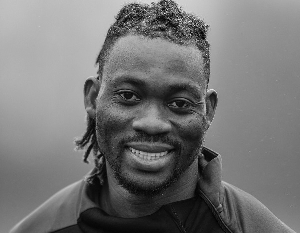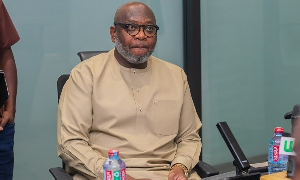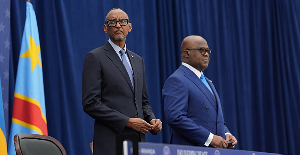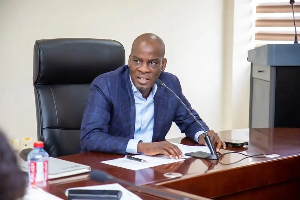Accra, Feb. 15, GNA -- Ghana is not considering the hosting of a regional US military base and the issue will not form part of discussions when President George W. Bush visits the country next Tuesday, Foreign Minister Akwasi Osei-Adjei told the Ghana News Agency in Accra.
Reports ahead of President Bush's visit suggest that the US government, in its renewed efforts to ensure peace and security along the Gulf of Guinea and also as part of its commitment to global fight against terrorism had approached some countries along the west coast including Ghana, to host a US military facility.
"Ghana is never considering hosting any US military base. President Kufuor considers Ghana as a sovereign country first and foremost. Our sovereignty is something we cherish so much, so I don't think he will take any such decision against the national interest," Mr Osei-Adjei said.
He said the two leaders would, however, review some issues relating to peace and security concerns of the sub-region.
"They will review some international issues of interest to both countries, particularly Ghana's role in addressing security concerns in the troubled sub-region since both countries benefit greatly from major military training support in the Ghana-US military cooperation." President Bush is leading a three-plane load delegation, comprising mostly business executives on a two-day visit to Ghana, beginning Tuesday, February 19. It will be his second visit to Africa after a similar visit in 2003. It would also mark a second visit by a sitting American President to Ghana within a decade after President Bill Clinton undertook a 19-hour trip to Ghana in 1998.
President Bush, accompanied by his wife, Laura, will also be visiting Rwanda, Tanzania, Liberia and Benin.
Highlights of the visit would be bilateral talks between President Kufuor and President Bush focussing on major policy initiatives such as the Millennium Challenge Account (MCA), the African Growth and Opportunity Act, President Bush's Malaria Initiative programme and his Emergency Plan for AIDS relief which has committed over 40 billion-dollar support for antiretroviral treatment globally. Mr Osei-Adjei said the two leaders would also take stock of relationship between their countries and explore further areas of collaboration and assistance.
Relations between the two countries are at an all-time high with Ghana receiving more than 55 million dollars in US development assistance in 2007.
Ghana was also approved the highest of 547 million dollars under the MCA meant for selected developing countries.
"It is one remarkable legacy that President Bush will be leaving behind in support of Ghana's development efforts, particularly in the area of poverty reduction," he said.
Ghana, seen as a model of democracy in West Africa, has become a focal point of many US initiatives to help promote democratic governance and expanded economic growth in Africa particularly through trade and private enterprises and support for global fight against terrorism. Mr Osei-Adjei, who is the immediate past Chairman of the Council of Ministers of the African Union, said the continental body and its members would remember President Bush's policy on Africa as the closest partnership and commitment ever enjoyed by Africa from an American presidency.
"Under President Bush, Africa has got more from US foreign policy than any previous American presidency," he lauded. Asked which areas he would wish US could improve in its policy on Africa, Mr Osei-Adjei urged that the developed world, including the US should pursue policies in support of a levelled playing field in the global market to enable the continent catch up and compete effectively with its goods.
"We must be given the chance to develop our industries," he added. He said the US and her allies should also do a lot more to help check pollution in Africa, explaining that pollution from activities of the developed world tended to affect Africa more than from her own activities.
"There should be a system to assist African countries to fight pollution." Mr Osei-Adjei also called on the US and others to partner Africa to look at the positive sides of migration of professionals from the continent.
"We should be able to join hands to make this benefit us -- I mean it should be brain-gain, rather than brain-drain."
General News of Friday, 15 February 2008
Source: GNA
Ghana not considering hosting a US military base
Entertainment











